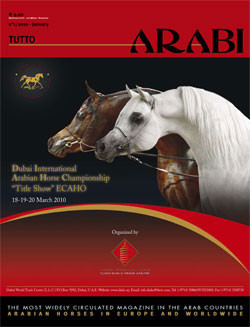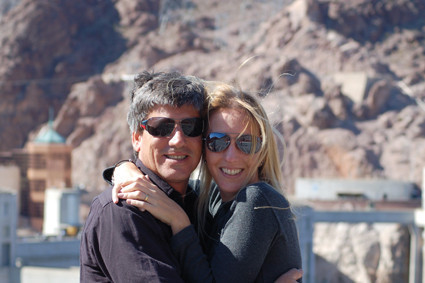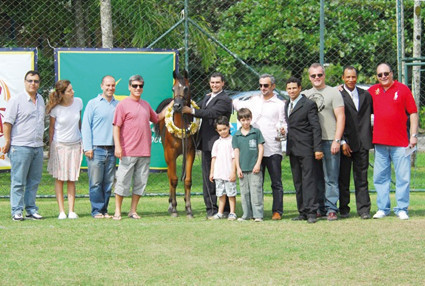Stud Training Center Zico Guardia
By Simone Leo
Photos by Rogerio Santos
Article courtesy of Tutto Arabi
Zico Guardia is one of the most famous people in our Arabian horse community. During our recent visit to Brazil, we had the opportunity to ask him extensively about his activity and his profession. First of all, for those who do not know the Stud Training Center, we would to introduce you to a corner of Paradise. In the region of Braganca Paulista (Saõ Paulo), Zico Cristiane and Fernanda Guardia have created a place where Arabian horses can live healthily and happily. The Stud Training Center is just one hour and half from the Saõ Paulo airport, and when Zico opened its gate, the scene we had before our eyes was amazing: horses enjoying the pastures, qualified staff working in a positive atmosphere. The center includes the main house, two stables with 40 boxes, 5 paddocks, veterinary facilities, show presentation ring, office, club house and 10 fenced runs. The stud covers 20 hectares and everything is clean and tidy. "A place where you can spoil your visiting friends and live with what we love the most, the Arabian Horses" commented Zico, who is about to celebrate 35 years of involvement with Arabian Horses. The secret to Stud Training Center's success lies in the relationship they cultivate with clients, allowing them to discover the real needs of each breeder, their breeding expectations and the Arabian horses they truly like. His experience in our worlds is thorough, as he has travelled all over the world. We asked Zico:
When did you get involved with Arabian horses?
Z.G.: I started with Arabian horses when I was twenty years old, when my father, who was also passionate about horses, bought one. That is when I fell in love with them and started working with these wonderful animals. It was this that convinced me to go to the USA to attend a horse school, where I also learnt how to manage a stud. On that occasion I met the Arabian horse and realized that this animal would play a leading role in my life. My adventure with the Arabian horse started when I went back to Brazil. I began with the ridden horse, evidence of how adaptable this wonderful animal can be, among its many talents, and I soon began to win ridden competitions. The American influence in Brazil could be felt already then, and conformation shows established themselves over the other competitions. My change to trainer was a direct consequence of this and was almost a natural progression. I continued travelling to America, and watching the shows and applying what I could see, I kept reaching remarkable results. From the start, it was very easy for me to work with the Arabian horse, because it is the most intelligent and balanced breed, with an amazing temperament. My activity as conformation trainer started in 1983, and I can say I saw this animal evolve and the change in the presentation style, which has evolved dramatically year after year. I have always tried not to be presumptuous and to continue studying breeding techniques, which were gradually becoming more advanced. I can say that I am totally happy with the way I can still achieve excellent results in conformation competitions presenting horses directly, even though now I tend to have a more managerial role. I currently manage several prominent international breeders.
T.A.: Are you still presenting Arabian horses bred in your farm and on behalf of your clients?
Z.G.: as I said earlier, my activity as a trainer continues, but for just a few selected clients. The Stud Training Center that I manage has everything that is required to work with the horses in the best possible way. I do not often present horses, I often condition them, prepare them for the most important competitions and present them directly. Thanks to my work as an observer and ramage, I lead my clients towards various well-established training centers for the most important competitions in Brazil, USA and Europe. Thanks to my attention to details, my choice changes depending on the circumstances, the period and, above all, the personality of the horse.
T.A.: In the last few years you have managed and sold a lot of horses in North America, South America, Europe and Middle East. You also traveled in every country in the world, including Australia. What is the key to your success?
Z.G.: I keep on travelling everywhere, from North to South America, in Europe, in the Middle East, in Australia and South Africa and luck has always been by my side. Over the last few years, I have almost always found what I was looking for for my clients, it would take a long time to list all the horses I had the pleasure to buy over the years. To be concise, I would like just to mention what happened in the last twelve months: during a trip to North America, on behalf of the Massari family I bought *Enjelicaa F, which became Brazilian National Champion. In Europe I have purchased several horses, but given the particularly favorable moment for *WH Justice bloodline, I would like to mention the leasing of *Amir Ashiraf by Haras Stigmatas, in cooperation with my dear friend Simone Leo. With regards to the past, I have very fond memories of *Carmen, sold in Italy to Mr. Angelo Scipioni with the cooperation of Paolo Capecci. She was then re-exported to the Middle East, to the Royal Jafaar Stud in Jordan to be precise, which is where she managed to win several titles, the most important one being the Middle East Championship. Sadly she died recently, and I like to remember as a dear friend. Over the years I have been a judge in several shows in Australia, Africa, Europe, North and South America and thanks to globalization we can share the same emotions in different parts of the world, which is one of the secrets of the Arabian Horse.
T.A.: We know that you are also a breeder. How many horses have you bred in your life?
Z.G.: I have created many many horses in my life, many of which are still with me whereas the others have been sold. When I create or buy a horse, I always think about my image of the perfect horse, the essence of everything I have learnt throughout my life. It is a great satisfaction seeing my products winning shows. Recently, I was so pleased to see that one of my colts won the latest Brazilian National Championship, *El Shkhyr. Having started breeding in 1983, I have been rewarded a lot, and over the years I have also lost some horses which I treated as real friends. Seeing one of my products being born is the source of great joy for me. Every year I have eight or nine mares covered, which I select among those that I have. I am now starting breeding through the embryo transfer technique, and I hope I will succeed in this new area for me, which allows me to speed up the breeding progress using also European stallions such as *WH Justice, *Ajman Moniscione, *Thor, sired by *Gazal Al Shaqab, recently imported from America. Nor do I neglect breeding straight Egyptians. In fact I have just purchased two straight Egyptian mares, which I think I will get in foal with *Ansata Nejdi.
T.A.: Could you tell me which qualities you look for when you are thinking about breeding?
Z.G.: What I required is the ideal Arabian horse, with a snub nose, a very fine head, small ears and large eyes, long and extended neck, 1.55 meters tall, a correct body that fits in a square, straight croup and well-marked movement. All this is much more important than color. The temperament of the horse is also of great relevance for me, they must be balanced, full of charisma, tame and quick at learning.
T.A.: Could you give us some examples of the successes you have reached with your client in the last few years?
Z.G.: Having happy clients is the greatest satisfaction for me. As I manage important studs, I need to win at shows. Many times, the horses that I bought for shows turn out to be also excellent sires or outstanding mares. The most important success is managing to buy horses on behalf of my clients that are able to create champions. It is difficult to interpret my clients' desires, everyone sees the Arabian horses from a different perspectives and with a different pair of eyes depending on their path that people take in our world. I always try to put myself in the client's shoes and try to fulfill their wishes.
T.A.: At what moment do you realize that a horse can be of high quality?
Z.G.: At the beginning I might have some hopes for a specific horse, but certainty can only be obtained in the ring. It is only there that one realizes whether the horse has the required traits for competitions or not. In any case, I always advise people try the horses on different types of terrains and in different situations, from indoor competitions to outdoor ones. From the results of these tests I can then gauge the qualities of each horse and their abilities. Not always do beautiful horses turn into champions. It takes all this to win, but especially their attitude towards shows, which is a talent they are born with.
T.A.: We know that you are also a judge. Which criteria do you use when you judge in America or in Europe. In your opinion, are these criteria the same?
Z.G.: For me it does not matter where I am judging, whether it is America, Europe or Africa. What is important is that the horse has winning qualities. The Arabian horse is fantastic and judging is a pleasure for me. I feel happy when I see a horse trot or show its talents in the standing position. Showing off is innate for many horses, what is important is not the individual score but that the best horse wins. What I value in a horse is principally type, charisma and how it expresses itself during the competition. Very important for me are also conformation, legs and the head, which must be proportionate. The Arabian horse is a rare creature, it either wins you over or not, but when it gets under your skin you can no longer live without it.
Our visit to Stud Training Center was over, but every day Zico is ready to share his passion with Arabian lovers and to help them reach their goals.












